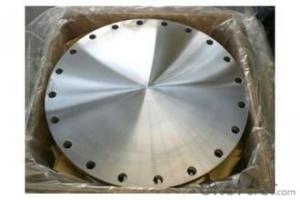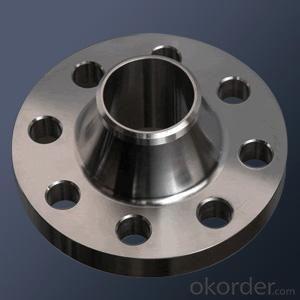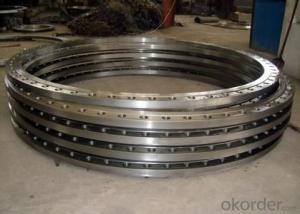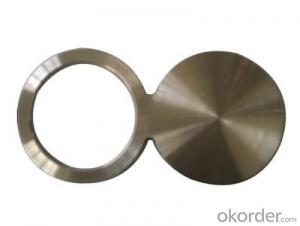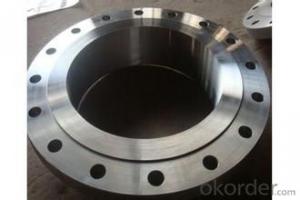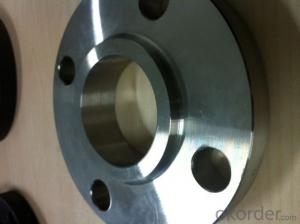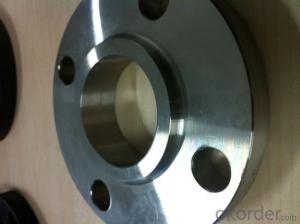STAINLESS STEEL PIPE FORGED FLANGES 304/316 ANSI B16.5 best price good quality
- Loading Port:
- Tianjin
- Payment Terms:
- TT OR LC
- Min Order Qty:
- 10 m.t.
- Supply Capability:
- 10000 m.t./month
OKorder Service Pledge
OKorder Financial Service
You Might Also Like
Package Of Stainless Steel Flange:
PACKED IN PLYWOOD CASES OR PALLETS
Painting Of Stainless Steel Flange:
ANTI-RUST OIL
Marking Of Stainless Steel Flange:
REFER TO MARKING DOCUMENT or AS PER CUSTOMER REQUEST
Shipping Marks Of Stainless Steel Flange:
EACH WOODEN BOX TWO PLASTIC SHIPPING MARKS
Specification Of Stainless Steel Flange:
Carbon Steel Flange Slip On Flange, Plate Flange, Blind Flange, Welding Neck Flange, Socket Welded Flange, Thread Flange, Lap Joint Flange, Long Welding Neck Flange
Size : 1/2"-48"
Wall Thickness.: SCH10-SCH160, SGP , XS, XXS, DIN ,STD
| Name | Stainless Steel Flange |
| Size | 1/2" - 48" |
| Face | RF, FF, RTJ |
| Wall thickness | Sch5-Sch160 XXS,STD,XS, SGP |
| Standard | ASME B16.5, B16.47, BS4504, JIS B2220, API 6A, 11Detc. |
| We can also produce according to drawing and standards provided by customers. | |
| Material | 304, 304L, 316, 316L, 304/304L, 316/316L, EN1.4301, EN1.4404 etc. |
| Packaging | Wooden Cases, wooden pallet , or carton box , or nylog bag and then in wooden cases |
| Surface Treatment | Anti-rust Oil |
| Delivery Time | 20-30 days, after received advance payment. |
| Quality | 100% Heat Treatment, No Welding repair |
| Others | 1.Special design available according to your drawing. |
| 2.anti-corrosion and high-temperature resistant with black painting | |
| 3. All the production process are made under the ISO9001:2000 strictly. | |
| 4. A conformity rate of ex-factory inspection of products. | |
| 5. we have export right , offering FOB , CNF CIF price |
STANDARD & MATERIAL GRADE
STAMDARD Of Carbon Steel Flange
| Standard | Pressure | Size | |
| European Standard | EN 1092-1 | Class PN6 ~ PN100 | DN10 ~ DN4000 |
| American Standard | ASME B16.5 | Class 150 ~ 2500 | 1/2" ~ 24" |
| ASME B16.47A | Class 150 ~ 900 | 26" ~ 60" | |
| ASME B16.47B | Class 75 ~ 900 | 26" ~ 60" | |
| German Standard | DIN 2527,2566,2573, 2576, 2627-2638,2641,2642,2655,2656 | PN6~PN100 | DN10 ~ DN4000 |
| Australian Standard | AS2129 | Table: T/A, T/D, T/E, T/F, T/H, T/J, T/K, T/R, T/S, T/T | DN15 ~ DN3000 |
| AS4087 | PN16 ~ PN35 | DN50 ~ DN1200 | |
| British Standard | BS4504 | PN2.5 ~ PN40 | DN10 ~ DN4000 |
| BS10 | T/A, T/D, T/E, T/F, T/H | 1/2" ~ 48" | |
| Japanese Standard | JIS B2220 | 5K ~ 30K | DN10 ~ DN1500 |
| API Standard | API 6A, 11D | 2000 PSI ~ 20000 PSI | 1 13/16" ~ 30" |
| French Standard | NFE 29203 | PN2.5 ~ PN420 | DN10 ~ DN600 |
MATERIAL Of Carbon Steel Flange
| Carbon Steel | ||
| Material Standard | Material Grade | |
| ASTM | ASTM A105 | A105, A105N |
| ASTM A350 | A350 LF1, LF2 | |
| ASTM A182 | F11, F12, F22 | |
| ASTM A106 | A, B, C | |
| DIN EN | DIN17175 | St35.8, St45.8, 15Mo3 |
| EN10216-2 | 195GH,P235GH, P265GH, 20MnNb6 | |
| JIS | JIS G3461 | STB340,410,510 |
| JIS G3462 | STBA12, 13, 20, 22, 23, 24 | |
| JIS G3454,G3455,G3456 | STPG 370, STB410, STS370,410, 510 | |
| STPT 370, 410, 480 | ||
- Q: Can steel pipes be used for wastewater disposal?
- Yes, steel pipes can be used for wastewater disposal. Steel is a durable and corrosion-resistant material, making it suitable for transporting and disposing of wastewater safely and efficiently.
- Q: What is the difference between internal coating and external lining of steel pipes?
- Steel pipes can be protected from corrosion and damage through two different methods: internal coating and external lining. When it comes to internal coating, a protective layer or coating is applied to the inner surface of the steel pipe. This is done to prevent corrosion or damage caused by the fluid or substance being transported through the pipe. Common materials used for the coating include epoxy, polyurethane, or polyethylene. These materials create a barrier between the pipe and the transported material, thus extending the pipe's lifespan and preserving the quality of the transported material. On the other hand, external lining involves applying a protective layer or lining to the outer surface of the steel pipe. The purpose of this is to shield the pipe from external elements like soil, moisture, chemicals, and physical damage. Materials such as polyethylene, polypropylene, or fusion-bonded epoxy are typically used for the external lining. By acting as a barrier, the lining prevents corrosive substances from coming into contact with the pipe and causing harm. Additionally, it helps maintain the pipe's structural integrity and prevents the formation of leaks or cracks. To summarize, the main distinction between internal coating and external lining of steel pipes lies in where the protective layer is applied. Internal coating focuses on the inner surface of the pipe, while external lining concentrates on the outer surface. While both methods aim to safeguard the pipe from corrosion and damage, they address different aspects of pipe protection.
- Q: What are the different methods of non-destructive testing for steel pipes?
- Some of the different methods of non-destructive testing for steel pipes include ultrasonic testing, magnetic particle testing, eddy current testing, radiographic testing, and visual inspection. These methods are used to detect surface and subsurface defects, such as cracks, corrosion, and discontinuities, without causing any damage to the pipes.
- Q: What is the purpose of steel pipes?
- The purpose of steel pipes is to efficiently transport fluids, gases, and solids from one location to another, providing a durable and reliable means of conveying materials in various industries such as construction, oil and gas, plumbing, and infrastructure.
- Q: Can steel pipes be used for sewage and wastewater systems?
- Yes, steel pipes can be used for sewage and wastewater systems. Steel pipes are highly durable, resistant to corrosion, and can withstand high pressure and temperature conditions, making them suitable for transporting sewage and wastewater efficiently and securely. Additionally, steel pipes have a long lifespan and can handle the abrasive nature of sewage and wastewater, making them a reliable choice for such systems.
- Q: Are steel pipes suitable for underground gas lines?
- Indeed, underground gas lines can be effectively constructed using steel pipes. Renowned for their robustness and longevity, steel pipes are a dependable option for distributing gas underground. Their exceptional resistance to external elements, including corrosion and impact, is crucial for upholding the gas system's integrity. Moreover, steel pipes possess the ability to endure high pressure and temperature fluctuations, guaranteeing the secure and efficient transportation of gas beneath the surface. Nonetheless, it is vital to emphasize the significance of adhering to proper installation techniques, such as implementing corrosion protection measures, in order to ensure the steel pipes' durability and prevent any potential leaks or accidents.
- Q: What are the different methods of welding steel pipes?
- There are several methods of welding steel pipes, including arc welding, TIG (tungsten inert gas) welding, MIG (metal inert gas) welding, and oxy-fuel welding. Each method has its own advantages and applications, depending on factors such as the thickness of the steel, the desired strength of the weld, and the available equipment.
- Q: How are steel pipes used in the manufacturing of food processing equipment?
- Steel pipes are commonly used in the manufacturing of food processing equipment due to their durability, strength, and resistance to corrosion. These pipes are used to transport various food products such as liquids, powders, and gases within the equipment. They are also utilized in the construction of frames, supports, and structures for food processing machinery, ensuring stability and longevity. Additionally, steel pipes are often employed in the creation of heat exchangers, which are crucial for heating or cooling purposes in food processing equipment.
- Q: What are the different types of steel pipe supports for seismic applications?
- There are several types of steel pipe supports used for seismic applications, including rigid supports, sway braces, and spring hangers. Rigid supports provide fixed support to the piping system, while sway braces are designed to absorb and redirect seismic energy. Spring hangers, on the other hand, are used to isolate and dampen vibrations caused by seismic activity. These different types of supports are selected based on the specific requirements and characteristics of the piping system and the seismic zone in which it is located.
- Q: Can steel pipes be used for oil refineries?
- Yes, steel pipes can be used for oil refineries. Steel pipes are commonly used in oil refineries due to their durability, high strength, and resistance to corrosion, making them suitable for transporting crude oil and refined products under high pressure and harsh conditions.
Send your message to us
STAINLESS STEEL PIPE FORGED FLANGES 304/316 ANSI B16.5 best price good quality
- Loading Port:
- Tianjin
- Payment Terms:
- TT OR LC
- Min Order Qty:
- 10 m.t.
- Supply Capability:
- 10000 m.t./month
OKorder Service Pledge
OKorder Financial Service
Similar products
Hot products
Hot Searches
Related keywords
